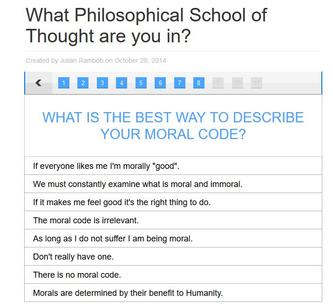
Perhaps morals and ethics aren't precisely the same thing but a large number of these options tend to fall under hedonism - I'd say - rather than representing a wide variety of philosophical schools.
What happened to some of the classics - like: Do No Harm - first coined by Hippocrates but elaborated on by the Dalai Lama where he added If you can, help others; if you cannot do that at least do not harm them.
But this list of morality extends to others only as a kind of consensus, like its a popularity contest, or the odious 'morals are determined by their benefit to humanity'.
The irony is that happiness tends to be directly proportional to the health of your relationships with others. The more you serve other people the happier you will be.
I've had people thank me for asking for their help. Sure I wasn't asking them for life long commitments to my well being, rather simple things like asking people to help open jars with tight lids... things that normally would take no more than a moment - but it wasn't me doing the thanking - rather it was them thanking me for letting them help me.
We are deeply social animals, we need to be needed and whatever our moral code is should reflect that. Hedonism and selfishness in general is run against the needs of my neighbor and necessarily worse for my neighbor and hence necessarily me. Until we realize we are rich in our neighbor and their wealth represents my wealth - in terms of if they are prospering, I in turn prosper (they are less likely to steal my stuff if they are wealthy).
This libertarian experiment showed this result in abundance. Libertarian thrift failed with catastrophic consequences.
 RSS Feed
RSS Feed
